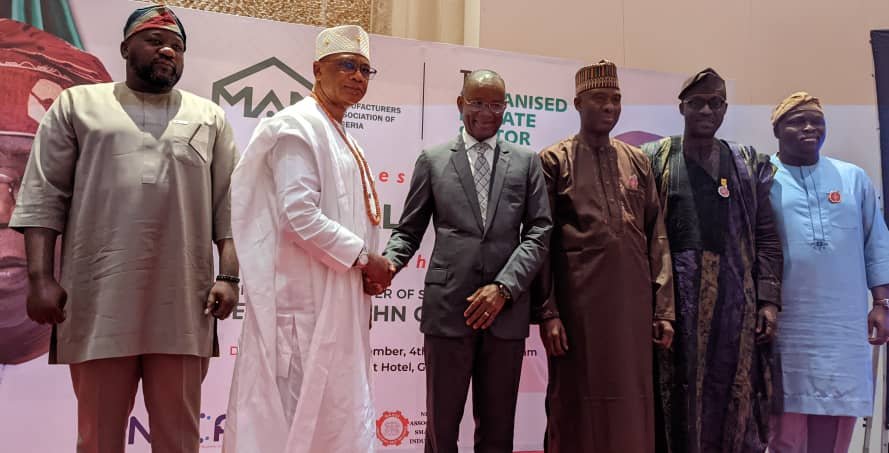From second left, The President Manufacturing Association of Nigeria, Otunba Francis Meshioye, Minister of State for Industry, Mr John Enoh, Pem Sec. Ministry of Industry, Trade and investment, Ambassador Nura Rimi, the Direction General of MAN, Mr Segun Ajayi during the first stakeholders engagement with the Minister of State for Industry held in Lagos on Wednesday.
Lagos: The Federal Government is to establish an industrial revolution work group to place the manufacturing sector on the path of sustainable growth, create more jobs, and enhance economic growth and development.
The Minister of State for Industry, Sen. John Enoh, gave the assurance at a meeting with manufacturers and key players in the industrial sector, as well as the Organised Private Sector (OPS) in Lagos on Wednesday.

(From second left, The President Manufacturing Association of Nigeria, Otunba Francis Meshioye, Minister of State for Industry, Mr John Enoh, Pem Sec. Ministry of Industry, Trade and investment, Ambassador Nura Rimi, the Direction General of MAN, Mr Segun Ajayi during the first stakeholders engagement with the Minister of State for Industry held in Lagos on Wednesday.)
The objective is to receive first-hand information on the constraints limiting industry performance and deliberate on practical solutions.
The minister said that the group to be chaired by himself would include the OPS chairman among some other key players.
He said that the group would meet quarterly with stakeholders to evaluate performance.
He said that there was the need for deliberate inter-ministerial collaboration to achieve more progress in the industry.
“While the work group would be responsible for identifying all the challenges facing the industry, there is need to collaborate with other ministries such as power and finance to ensure we resolve the challenges one after the other,” Enoh said.
He said that legislative review and regulatory reforms would be looked into to facilitate ease on doing business in Nigeria.
He added that the Federal Government was committed to resuscitating the textile industry to create more jobs for the youths.
Enoh assured stakeholders of his resolve to achieve success, while calling for resilience and more collaboration with stakeholders.
The President, Manufacturers Association of Nigeria (MAN) , Chief Francis Meshioye, said that strategic collaboration with the sector would facilitate the much-desired performance improvement in the industrial sector.
He said that the industrial sector, as a catalyst for sustainable economic growth, remained a core enabler, with its inter-sectoral linkages providing fastest route to achieving economic aspirations.
Meshioye, however, said that there were challenges that should be addressed.
According to him, the challenges are responsible for the lackluster performance of the industrial sector over the years.
“Clearly, the challenges are enormous, but we are confident that if we work together, we can co-create the solutions and place the sector on the path of sustainable growth.
“We are committed to working collaboratively with your ministry to develop and implement policies that would fastrack industrial growth, increase productivity and create jobs.
“We are open to establishing a regular dialogue mechanism for re-assessment of existing polices and facilitation of possible re-designs of some to achieve desired results,” he said.
The Director-General of MAN, Mr Segun Ajayi-Kadir, said the manufacturing sector remained a leading contributor to the economy in spite of challenges.
He urged the Federal Government to provide equity fund to micro, small and medium enterprises and increase infrastructure provision to aid the development of the country’s special economic zones.
He also urged the government to prioritise allocation of foreign exchange to manufacturers, review the timeframe for backward integration of crops and minerals, and strategically tackle security challenge.
The director-general said that government at all levels should overhaul the existing educational curriculum to emphasise skill acquisition.
“Government should compel all its institutions to patronise locally-produced goods for all government contracts and purchases in compliance with relevant legislation and presidential executive orders.
“We need provision of adequate support for innovation in local production processes, and government should intensify efforts toward upscaling raw material development and utilisation,” he said.










